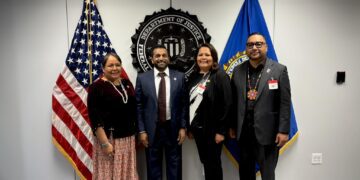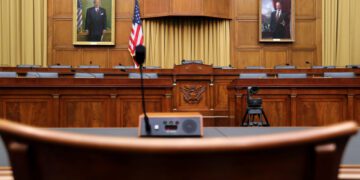By John F. Di Leo -
Reflections on George Washington’s Birthday
For many Americans, the winter of 2020-2021 is unusually harsh. More frequent snowfalls in areas that have grown unaccustomed to it, combined with subzero temperatures in states that haven’t designed their infrastructure for such conditions, have reminded us all of how unpredictable the forces of nature can be.
We can bundle up and head outside, armed with shovel and snowplow, to render our paved sidewalks and streets usable again. We can crank up the furnace or the heat lamp, keep the water running so that pipes don’t freeze. There are ways to get through this, in this modern era. Stores still get deliveries so we can buy food; with home computers and the internet for videocalls, most of us can still get to work.
But now, think back a couple hundred years, and imagine the challenges such a winter must have placed on the Founding Fathers, in an era without these modern technologies. Imagine a lack of funds, tools, supplies or food. And imagine all these concerns weighing on the shoulders of General George Washington, as he spent his 46th birthday with his starving, shuddering troops, during the miserable winter they spent at Valley Forge, Pennsylvania.
Unlimited Challenges
In the 18th century, armies tended not to fight during the winter. Europeans were so accustomed to wars lasting decades, or even generations, that they generally made warfare a seasonal thing. Late in the fall, they would identify a spot to camp, and build what they called “winter quarters” – which could be anything from shabby tents to basic wooden barracks.
As 1777 came to a close, the British took control of Philadelphia, then the biggest city in America, and settled in for the winter in comfort, forcing the Continental Congress to flee a hundred miles west, to York, PA. General Washington put the Continental Army into winter quarters at Valley Forge, Pa, just 25 miles or so west of the General Howe’s Redcoats.
At this time, the United States faced a number of nearly insurmountable challenges.
We were alone, facing off against the greatest military power on earth at the time. We were utterly impoverished, as a nation – a decade of boycotts against British tyranny had largely wiped out the private sector before the war, and now the weak federal alliance had virtually no revenue source other than borrowing from domestic and foreign lenders who were increasingly tapped out.
Lacking a military alliance, we were up against not only Great Britain, but Britain’s allies such as Hanover and a number of Indian tribes. While it’s easy to assume the advantage of distance, the English always had their Canadian colonies as a reasonably friendly nearby base as well. All we had on the world scene was then a sort of friendship with the French – they were happy to help us make trouble for their historical rival, Britain, but they weren’t yet ready to enter the war themselves.
So it was all on us. Or should we say, it was all on General Washington.
As Commander in Chief, he had three enemies: the British armed forces, infinitely stronger than ours… his endless supply shortages, which left his troops literally unclothed, unfed, and unarmed… and constant cabals against his own leadership, both in the upper echelons of the army and in the halls of Congress.
And now, on top of all those problems, he had one new problem to add: a winter so rough that his troops were freezing as well as starving, a snowy winter that made it even harder than usual to get food into camp and to keep their arms safe and dry.
Things had gotten so crazy (yes, that’s the only word for it) that Congress foolishly sent the Marquis de Lafayette north at the end of January, directing him to pick up 2500 troops at Albany, capture Canada (yes, Canada), and return it to France. When the young Marquis arrived in Albany to find less than half the promised troops and none of the needed provisions, he had the good sense to recognize the impossibility of the mission and arranged to rejoin Washington and the body of the Continental Army.
This ludicrous waste of time and energy was just one of countless examples of the foolish micromanagement that some in Congress often attempted. Believing Washington to be too timid in his refusal to engage an incredibly superior enemy force, they pushed others to do so.
Reality and Fantasy
A substantial part of the problem back then – as it always is, in politics, even today – is that some people, like Washington, lived in the real world, while others, like many in Congress, did not.
Well aware of the fact that the fledgling United States could never beat Great Britain in a traditional war – we were out-manned, out-experienced, and out-supplied – Washington knew that our only hope was a Fabian strategy. We didn’t have to win, exactly, we just had to outlast them. Eventually, the domestic pressure on Parliament to end a protracted war would win the war for us… as long as we didn’t run headlong into battles in which we were so terribly outnumbered, we could be destroyed.
By contrast, many in Congress seemingly imagined that soldiers didn’t need coats or boots or even pay, and that gunpowder and ammunition grew on shrubs in the winter, ready to be harvested by soldiers who, after all, had nothing else to do.
That’s really not much of an exaggeration. Some in Congress were literally offended that we had soldiers who insisted on pay to support their families; they believed that the patriotic fervor that inspired them to volunteer should be sufficient to propel them from battle to battle, for years at a time.
But more in Congress simply didn’t realize how bad the conditions were. While the Redcoats in Philadelphia had the best uniforms the British crown could provide, our soldiers were shivering in threadbare shirts and pants, often without socks or boots. They received regular dispatches from the Commander in Chief; he had done his best to keep them up to date ever since they sent him to Cambridge, almost three years earlier. But his news was so often bad, his honest accounts so often depressing, many in Congress had come to assume he was exaggerating the downside.
Luckily, at about this time, a few fortunate coincidences appeared, and General Washington made the most of them.
Congressional Opportunities Arise
On January 24, Congress sent a five-man committee to travel the 75 miles to Valley Forge (that doesn’t sound like much today, but remember: no cars, no roads, deep snow, and a nearby enemy army), and see the conditions on the ground for themselves.
Congressmen Francis Dana, Gouverneur Morris and the rest were shocked at what they witnessed. Washington led them on a tour of the camp, displayed their genuine state of need beyond the shadow of a doubt, and presented them with the formal, impeccably detailed 16,000 word report on which he and aide-de-camp Alexander Hamilton had been working for weeks. The report left no issues unaddressed; any reader would see that no rational options existed other than supporting Washington’s strategy.
The committee returned to Congress enlightened. This was still the Washington who had kept Boston under siege for a year on a bluff while he waited for the gunpowder of disparate donors and the guns of Fort Ticonderoga to arrive. If he could stall for time back then, he could do it again. But he would still, eventually, need the supplies to arrive.
Congress returned to session and went to work. The Congress of those days was the weakest government imaginable; whatever grants they agreed to would need to somehow be collected from states that were themselves broke and uncooperative. But at least Washington had convinced them of the need to work harder – and faster – to acquire food and clothing for the troops, to replenish their stores of firearms and ammunition, and to fight for a proper pension in addition to wartime pay. The knowledge that Congress was working on these matters would minimize the desertions and keep the Continental Army intact for another season of fighting.
A Foreign Inspector General?
One of Washington’s key frustrations ever since his arrival in Cambridge in 1775 was the lack of proper military form in the Continental Army. As a philosophically “republican” force, the rigorous standards of military manners had never taken root; our officers knew such standards would help our forces, but it was hardly in their DNA. Washington himself had never served in Europe; born in Virginia on February 22, 1732, he had applied for naval service in the late 1740s but was turned down, so even our commander didn’t have the expertise in military drill that was clearly needed.
If General Washington was to impose a proper European military demeanor on this army, he might need an actual European to do it.
Now, into the story of the American War of Independence, enters the uniquely talented Prussian mercenary – with a letter of introduction from Benjamin Franklin: Friedrich Wilhelm August Heinrich Ferdinand von Steuben, best known simply as Baron Von Steuben.
The Baron had seen considerable service across Europe, and while his resume was doubtless exaggerated a bit to get as high a posting in America as he could, he was a perfect fit. He didn’t speak English or know our terrain, but outside of that, he was definitely exactly what we needed at the time.
Von Steuben presented himself to Congress on February 5, 1778, and arrived at Valley Forge on February 23, the day after Washington’s birthday (the General probably didn’t think of the connection, but in retrospect, it’s irresistible to note).
General Washington was always best at identifying talents and putting them to their best use. He immediately appointed von Steuben Inspector General, pending formal approval of the post by Congress (which followed in May), and set him to work auditing the books, studying the design of the camp, and evaluating our forces.
Von Steuben redesigned the camp. With Prussian efficiency, he ordered that the barracks layouts be reordered, and that kitchens and latrines be on opposite ends of the camp… he required clear and robust recordkeeping to account for not just uniforms but arms and other supplies… and he organized an honor guard of 120 to be the first phase of a proper drilling process.
Washington appointed his aide, Col. Hamilton – fluent in French thanks to his mother’s instruction – to be the chief translator for Von Steuben’s drills. Von Steuben’s staff worked with Hamilton and General Nathaniel Greene to build a training manual for the Continental Army from scratch. It proved to be such a successful approach that it remained the core of American military training methods for generations.
Due to King George III’s Hanoverian heritage, the British had already sent many thousands of Hessian soldiers against us over the course of the war. Soon it would be clear that our talented German soldier, the one and only Baron Von Steuben, was himself worth thousands of Hessians to the Glorious Cause of Independence.
Survival for a Brighter Future
Changes, however, don’t happen overnight. General Washington’s supervision of the Continental Army at Valley Forge lasted six months, from December 1777 to May 1778. He entered with 11,000 troops, and about 2500 of them had died of some combination of disease, starvation and the extreme cold by the time the hot summer of 1778 arrived. An intolerable result, at least partially due to the financial and authoritative weakness of the Continental Congress form of government (which the participants would remember, and fight to correct a decade later, at the Constitutional Convention).
It was a miserable winter, but General Washington made the most of it, having his men drill and exercise, hunting the woods for game to supplement what they could borrow or buy from farms and collect from Congress. Washington believed in making the most of the time spent at winter quarters, to be as ready as possible for the battles to come.
Like he did every winter, General Washington hoped that officers’ wives would spend winter quarters with the troops, and many did, under the general leadership of his own wife Martha Washington. They helped with whatever their talents were, usually sewing shirts and socks for the soldiers from whatever fabric they could collect or supply themselves.
Early in the year, the French decided to up the ante: quiet, under-the-table assistance to the American cause would be replaced with a formal alliance. In May, Congress had completed negotiations and ratified our alliance with the Bourbon King of France against the Hanoverian King of England. We would finally have an ally who could fight the English in Europe, the Mediterranean, and even the Indian Ocean, making this a truly global contest, and evening the odds considerably.
The winter of 1777-1778 was a terrifying challenge to the American spirit. Losing a quarter of our troops to weather and poverty was a terrible price to pay. But General Washington kept the Continental Army intact, and kept the British from attacking from their own position of comfort, just 25 miles away.
And through that crucial blend of political and administrative skills, General Washington finally spurred Congress to do their jobs in supplying our forces, and set the right people in position to strengthen our forces.
A commander in chief must be something of a chess player, making the most of every piece, to deliver a successful strategy:
General Washington inspired the officers and their wives to make desperately needed clothing. He appointed the right military minds to design a training regimen. His communication with Congress overcame the machinations of troublemakers to win necessary support for his troops. His close work with diplomats and generals such as Lafayette helped Franklin achieve the French alliance.
It has been said that Valley Forge was the lowest point of the war. True in many ways. But it was also the time that so much was accomplished, both be design and by luck, orchestrated skillfully by our Commander in Chief.
For this and so many more accomplishments, George Washington has been known since his own time as the Father of his Country. Never was an honorific better deserved.
As we celebrate his birthday and honor his memory, may we again win the blessings of Divine Providence, to save this great nation, so lovingly designed and dearly won by the greatest generation in human history.
Copyright 2021 John F Di Leo
John F Di Leo is a Chicagoland-based trade compliance trainer, writer and actor. A former county chairman of the Milwaukee County Republican Party, his columns have been found in Illinois Review since 2009. A collection of his semi-fictional Illinois Review columns illustrating vote fraud in America, the Tales of Little Pavel, is available in either eBook or paperback on Amazon.
There was a time when the story of Valley Forge was taught in every schoolroom in America; our education system has stumbled badly over the years. For more about George Washington and the Founders, please read the many great histories and biographies by Kevin Gutzman, Richard Brookhiser, Joseph Ellis, Harlow Giles Unger, James Thomas Flexner, and so many more talented researchers and writers, who have dedicated their lives to keeping the great achievements of the Founding Generation within reach of the American reader.
Don’t miss an article! Use the tool in the margin to sign up for Illinois Review’s free email notification service, so you always know when IR produces new content!
(portrait credit: Washington and Lafayette at Valley Forge, by John Ward Dunsmore)








